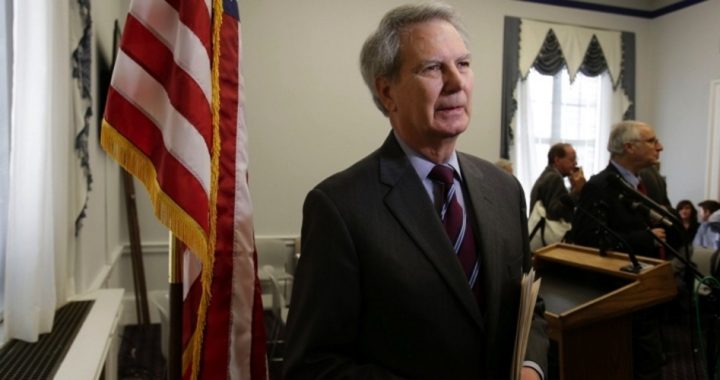
President Obama will be guilty of an impeachable offense if he intervenes militarily in Syria’s civil war without authorization from Congress, according to a resolution introduced in Congress by Rep. Walter B. Jones, Jr. (shown, R-N.C.).
House Concurrent Resolution No. 40 declares “the sense of Congress” to be that ” the President is prohibited under the Constitution from the offensive use of the United States Armed Forces in Syria without prior express authorization by an Act of Congress or without a prior express appropriation of funds for that purpose by an Act of Congress…. The President’s defiance of those constitutional limits on his authority to initiate war would constitute an impeachable high crime and misdemeanor under article II, section 4 of the Constitution.”
The Obama administration has called on Syrian President Bashar al-Assad to abdicate in the civil war that has taken the lives of more than 93,000 people in Syria, and has recently announced that the United States would be sending offensive arms to the rebel forces attempting to overthrow the regime. But the president has not intervened with military action of our own, despite calls for it by some members of Congress, most notably John McCain, (R-Ariz.), Obama’s opponent in the 2008 election. McCain and fellow Republican Lindsey Graham of South Carolina have said the United States need not put “boots on the ground” in Syria, but could help the rebels by attacking government planes and airfields with Patriot missiles and by providing a “safe zone” for the insurrectionists along the Turkish border. Obama did intervene with an air campaign against government forces in the Libyan civil war that overthrew Moammar Gadhafi in 2011. That move appeared to backfire when heavily armed militants attacked a U.S. diplomatic facility in Benghazi on September 11, 2012, killing the U.S. ambassador to Libya and three other Americans.
The Jones resolution warns that military aid to the Syrian insurgents carries with it the risk of “blowback,” recalling the weapons and other assistance given insurgents in Afghanistan fighting the Soviet occupation in the 1980s. The Afghan Taliban and other radical Muslims turned on the United States, culminating in “the 9-11 abominations,” the resolution states.
Jones, 70, is in his tenth term in the House. He was initially a strong supporter of the U.S. invasion of Iraq and the overthrow of the Saddam Hussein regime in 2003 that led to a nearly nine-year-long war against insurgents in that country. He even joined with other members of Congress in the successful effort to have French fries renamed “Freedom fries” in the congressional dining rooms as a protest against France’s refusal to support the Untied States’ unsuccessful effort to gain a United Nations resolution supporting war on Iraq. Jones turned against the war effort when Iraq’s alleged weapons of mass destruction were not found. He co-sponsored a resolution calling for the withdrawal of U.S forces to begin by October 2006 and supported a later resolution setting a withdrawal deadline of September 1, 2008. U.S. combat unites finally left at the end of 2011.
Jones also attributed his turnabout on the war to the experience of attending the funeral of a soldier from his district killed in Iraq and hearing a reading of his final letter home. The war took the lives of nearly 5,000 Americans, while leaving at least 100,000 Iraqis dead and some two million more homeless. The cost to the United States has been a trillion or more dollars, with the costs continuing to rise with ongoing medical care for those wounded and maimed in the war.
“We cannot continue to spend American money and risk American lives overseas without a vote of approval from Congress,” Jones said in a press release posted on his website. “For too long, the legislature’s responsibility to authorize military force has been overlooked. It is time that we uphold the Constitution, which makes it clear in Article 1, Section 8 that Congress alone holds the power to declare war. A breach of that principle by the president would unquestionably be considered an impeachable offense.”
A president may be impeached by a simple majority of the House of Representatives. He then must be tried by the Senate, where a two-thirds vote is required to remove a president from office. Two presidents have been impeached, though neither was expelled by the Senate. Andrew Johnson, who became president upon the death of Abraham Lincoln, was impeached in a separation of powers dispute with Congress. The House voted for impeachment in 1868 after Johnson had fired Secretary of War Edwin Stanton in violation of the Tenure of Office Act. Johnson survived the trial, with the Senate vote one short of the 36 needed for removal. Bill Clinton was impeached in 1998 over charges of perjury concerning his sexual misconduct, and was also acquitted in the Senate trial. A House committee drew up articles of impeachment against Richard Nixon in 1974 for various offenses committed in the scandal known as Watergate, but Nixon resigned before the issue reached the full House.
It remains to be seen if the Obama administration’s arming of Syrian rebels and the stationing of a Patriot missile system and troops in Turkey will lead to American “boots on the ground” in Syria after all. Sarah Palin, the former Alaska governor who was McCain’s running mate in the 2008 campaign, recently noted that both sides in the Syrian civil war claim to be killing each other for Allah. “I say let Allah sort it out,” Palin said in what columnist Pat Buchanan has approvingly dubbed “the Palin doctrine.” It is a “doctrine” the president of the United States might well heed. Allah, after all, can’t be impeached by the U.S. House of Representatives.
Barrack Obama could be.
Photo of Rep. Walter Jones: AP Images



